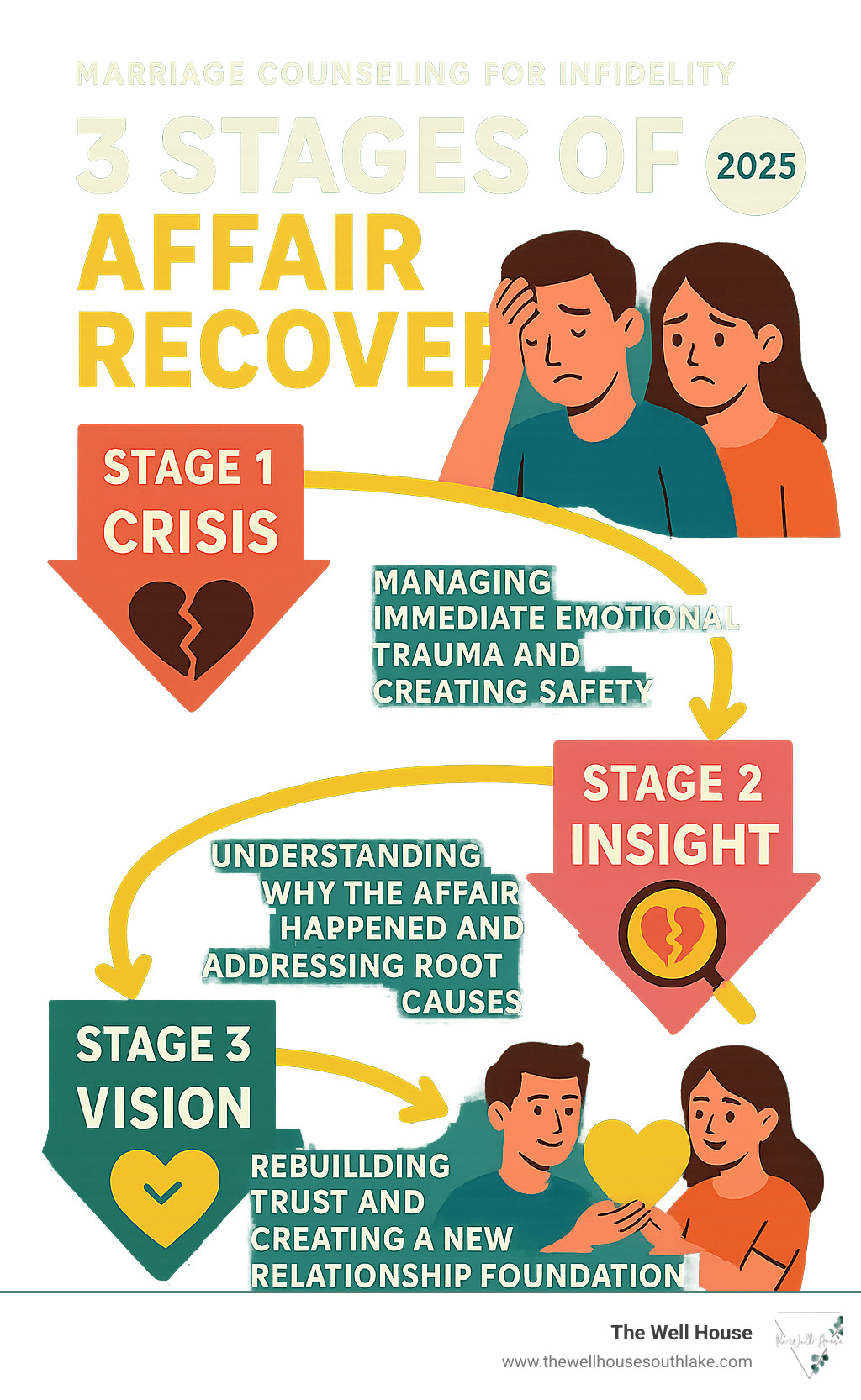Beyond the Betrayal: Rebuilding Trust and Intimacy with Marriage Counseling
Why Marriage Counseling for Infidelity Can Save Your Relationship
Marriage counseling for infidelity offers a structured path to healing after betrayal. Research shows that many marriages can survive infidelity when both partners commit to the recovery process. Here’s what you need to know:
Key Benefits of Infidelity Counseling:
- Creates a safe space for both partners to process emotions
- Addresses root causes that led to the affair, not just symptoms
- Rebuilds trust through structured accountability and transparency
- Restores intimacy by helping couples reconnect emotionally and physically
- Provides expert guidance to steer the complex healing journey
What Makes Counseling Effective:
- The therapist focuses directly on the affair.
- Both partners take responsibility for their roles.
- Clear boundaries and expectations are established.
- Healing happens in stages: Crisis, Insight, and Vision.
Infidelity often signals deeper, pre-existing relationship issues. While the unfaithful partner is responsible for their choices, effective counseling examines the whole picture—not to assign blame, but to foster understanding and healing. Recovery isn’t quick or easy, but with the right support, couples can move beyond the betrayal to create a new, meaningful relationship.
I’m Jennifer Kruse, a Licensed Professional Counselor Supervisor. I use a holistic soul-mind-body approach to guide couples through the complex journey of marriage counseling for infidelity. I’ve witnessed how couples can transform their deepest pain into profound healing and renewed connection.

Basic marriage counseling for infidelity vocab:
Understanding the Crisis: Why Affairs Happen and What to Do First
When infidelity is finded, it hits like a lightning strike, shattering everything you thought you knew about your marriage.
The immediate aftermath is overwhelming. Betrayal trauma floods in with waves of rage, despair, and profound pain. For the betrayed partner, this is often genuine trauma. The American Psychological Association defines trauma as “an emotional response to a terrible event…”, and finding infidelity qualifies.
This is why marriage counseling for infidelity must be trauma-informed. We’re not just dealing with a relationship problem; we’re helping someone heal from a deeply wounding experience. Trauma-Informed Marriage Counseling provides the specialized care needed during this vulnerable time.
Common Reasons for Infidelity
It’s natural to ask, “Why?” Understanding contributing factors isn’t about excusing the behavior—the unfaithful partner is fully responsible. But identifying underlying issues is crucial for healing.
Affairs can happen even in seemingly happy marriages. Common culprits include lack of communication, where unmet needs and resentments build, and emotional neglect, which creates a void of connection. Sometimes unmet needs for intimacy or validation create vulnerability. Low self-esteem can drive a search for external validation, while stressful life changes can strain a marriage to its breaking point. Research shows that stress can influence whether infidelity occurs. A breakdown of intimacy can leave couples feeling like roommates, and often, unaddressed marital problems have been festering for years.
The Emotional Aftermath for Both Partners
The emotional toll hits both partners hard, just in different ways.
Betrayed spouses often experience PTSD-like symptoms: intrusive thoughts, flashbacks, and hypervigilance. Anxiety and depression are common, along with overwhelming grief, anger, and confusion.
Unfaithful spouses face their own storm. Guilt and shame can be crushing. Remorse mingles with fear of losing their family, and many struggle with confusion about their choices. Research shows that infidelity can worsen depressive symptoms and lower self-esteem in the unfaithful partner, too.
Both partners are in pain. This shared suffering, while agonizing, can become a foundation for rebuilding if they’re willing to do the work.
Immediate Steps to Take After Findy
The findy of an affair creates a crisis. The first days and weeks are crucial, and missteps can cause lasting damage.
Don’t make permanent decisions while emotions are high. Create space—separate bedrooms or temporary living arrangements—to let the shock settle. Seek support from trusted friends or family who can offer comfort without fueling anger. End the affair immediately; this is non-negotiable. All contact must stop.
Full transparency is essential, but avoid sharing intimate details without professional guidance. A counselor can help facilitate these conversations safely. Avoid the blame game; while accountability matters, getting stuck on fault prevents healing. Conflict Resolution Marriage Counseling can provide tools for these conversations.
Most importantly, seek professional help immediately. Don’t try to steer this crisis alone. If either partner has thoughts of self-harm, seek medical attention right away. The goal now is crisis management: stopping the bleeding and creating enough safety to begin healing.
The Path to Healing: What Effective Marriage Counseling for Infidelity Looks Like
After the initial crisis, couples often wonder, “What now?” Professional marriage counseling for infidelity is your lifeline—a skilled guide to help you steer the path to healing. Effective counseling creates a neutral, safe space where both partners can process their pain without spiraling into blame. A skilled therapist facilitates the healing process in manageable steps.
Couples-based interventions are proven effective for addressing infidelity, but both partners must engage fully. This isn’t about quick fixes; it’s about addressing the root causes. As we often tell couples, Why Marriage Counseling Couples Therapy is for Everyone—it’s a powerful tool for growth, especially after a crisis.
Key Components of Successful Infidelity Counseling
Not all therapists are equipped to handle infidelity recovery, as many graduate programs offer little specific training. Finding the right therapist is crucial.
Research by Peggy Vaughan revealed that many couples find counseling frustrating. A common complaint was that therapists didn’t focus directly on the affair, instead treating it like any other marital problem.
Effective marriage counseling for infidelity requires specialized expertise. The therapist must understand that infidelity is a specific trauma needing targeted treatment. They must focus on the affair as the primary injury.
Individual accountability is non-negotiable. The unfaithful partner must take full responsibility for their choices, without excuses. While marital problems may exist, the decision to have an affair belongs solely to the person who cheated.
A good therapist will ensure no blame falls on the betrayed spouse. While both people contribute to relationship dynamics, the choice to cheat is entirely on the unfaithful partner.
Establishing new boundaries is essential. These are clear, non-negotiable agreements that create safety. The therapist helps facilitate healthy communication about these boundaries. Communicating With Your Partner For Better Connection becomes a foundational skill developed during this process.
Common Therapeutic Approaches
Different therapeutic approaches offer unique tools for healing. A skilled therapist often combines elements from various methods to best serve each couple.
| Approach | Focus | Key Techniques | Benefits for Infidelity |
|---|---|---|---|
| Emotionally Focused Therapy (EFT) | Attachment and bonding styles, emotional responses | Identifying negative interaction patterns, de-escalating conflict, creating secure emotional bonds | Helps couples understand the emotional trauma of betrayal and rebuild secure attachment. Emotionally Focused Couples Therapy helps couples identify negative emotional response patterns and replace them with positive ones. |
| Gottman Method | Relationship health, conflict management, building fondness | Identifying “Four Horsemen” (criticism, contempt, defensiveness, stonewalling), building love maps, expressing appreciation | Provides practical tools for communication, conflict resolution, and rebuilding positive interactions after the damage of infidelity. |
| Cognitive Behavioral Therapy (CBT) | Identifying and changing negative thought patterns and behaviors | Challenging irrational thoughts, developing healthier coping mechanisms, behavioral experiments | Helps both partners manage intense emotions (anxiety, depression, remorse) and change unhelpful behaviors. Couples can effectively improve problem-solving and behaviors. |
Emotionally Focused Therapy is powerful because it helps couples understand their attachment styles and how the affair disrupted their bond. The Gottman Method offers practical tools for daily interactions, helping couples eliminate the “Four Horsemen” that can poison a relationship. Cognitive Behavioral Therapy helps both partners manage overwhelming emotions by teaching healthier ways of thinking and coping.
Common Pitfalls to Avoid in Therapy
Unfortunately, not all therapy is helpful. The biggest mistake is when therapists focus on general marital problems instead of directly addressing the affair. This leaves couples feeling unheard and stuck.
Another harmful approach is blaming the marriage or suggesting the betrayed spouse is partially responsible. This is inaccurate and deeply damaging. Rushing forgiveness is another common mistake, as it’s a personal journey that can’t be forced. Some therapists ignore the trauma aspect of infidelity, failing to address the deep emotional wounds.
Finally, if the unfaithful partner isn’t held accountable, therapy will likely fail. Without genuine responsibility and transparency, rebuilding trust is impossible.
At The Well House, we’re committed to avoiding these pitfalls. Our therapists receive specific training in infidelity recovery, understand the trauma it creates, and know how to guide couples through healing.
Rebuilding Your Foundation: Restoring Trust and Intimacy
After the initial crisis, couples face the challenging yet hopeful phase of rebuilding. This isn’t about returning to the old relationship, but creating something new together. The journey requires immense patience, unwavering commitment, and a willingness to create a “new normal.” As the American Psychological Association notes, rebuilding trust takes time and effort from both partners.
Forgiveness is a choice, not a feeling. It’s something the betrayed partner chooses when they’re ready, not when pressured. This process can’t be rushed.
In marriage counseling for infidelity, I’ve witnessed many couples build something stronger than what they had before. It requires both partners to show up differently, but the resulting connection can be remarkable.
The Critical Role of Accountability in marriage counseling for infidelity
Without genuine accountability from the unfaithful partner, trust cannot be rebuilt. This goes beyond a simple “I’m sorry.”
Taking full responsibility means owning the choice completely—no excuses or blaming. The choice to cheat belongs entirely to the person who made it.
A meaningful apology requires appreciating the harm caused, specifying the wrongdoing, explaining the personal failings that led to the choice (without justification), and stating what actions are being taken to change. Words alone aren’t enough; demonstrating change through actions is what truly matters. This means showing up consistently, being transparent, and actively working on personal and relational growth.
A Step-by-Step Guide to Rebuilding Trust
Trust is rebuilt through small, consistent actions over time.
Complete honesty becomes the new foundation. The unfaithful partner must commit to full disclosure and answer all questions truthfully, even painful or repetitive ones. This includes transparency with devices like phones and email, without defensiveness.
Consistent, reliable behavior re-establishes safety. Showing up on time, following through on commitments, and keeping promises are crucial. Every broken promise erodes the fragile trust being rebuilt.
Perhaps most importantly, ending all contact with the affair partner is non-negotiable. Any continued contact will destroy progress. If the affair partner is a coworker, clear professional boundaries must be set, and changing jobs may be necessary.
Rekindling Emotional and Physical Intimacy After an Affair
Infidelity often leaves intimacy feeling broken. The good news is that it can be rebuilt, often becoming deeper than before.
Non-sexual touch, like holding hands or brief hugs, helps rebuild comfort with physical closeness. Relearning emotional closeness happens through deep conversations, active listening, and sharing vulnerabilities. Vulnerability is essential for both partners.
Creating shared experiences helps build new positive memories and can shift the focus from past pain toward future possibilities. Rebuilding sexual connection slowly requires enormous patience and open communication. It’s vital to address fears openly, perhaps with professional guidance, to create safety for both partners.
Research suggests that sexual satisfaction can predict emotional intimacy, highlighting how physical and emotional connection interweave in the healing process.
Frequently Asked Questions about Infidelity Counseling
When couples are struggling with the aftermath of an affair, they often have burning questions about what lies ahead. These are some of the most common concerns I hear in my practice, and I want to address them honestly and compassionately.
Can a marriage really survive infidelity?
Yes, absolutely. While this may feel impossible to believe right now, many marriages not only survive infidelity but actually become stronger and more resilient than they were before. I’ve witnessed this change countless times in my practice.
The key factor isn’t the absence of problems – it’s both partners’ commitment to the healing process. When the unfaithful spouse takes full responsibility without excuses, and the betrayed partner is willing to engage in the difficult work of rebuilding, recovery becomes possible. Statistics show that over 70% of marriages survive infidelity, which offers real hope during what feels like the darkest time.
This doesn’t mean the journey is easy or that the pain isn’t real. But it does mean that the devastating betrayal you’re experiencing right now doesn’t have to be the end of your story. Many couples tell me later that while they never would have chosen this path, they finded depths of intimacy and connection they didn’t know were possible.
How long does marriage counseling for infidelity take?
I wish I could give you a simple answer, but healing from infidelity doesn’t follow a predictable timeline. Every couple’s journey is unique, and the duration depends on several important factors.
The depth of the betrayal plays a significant role. A one-time mistake may require less time to work through than a long-term emotional affair. Both partners’ willingness to fully engage in the therapeutic process also dramatically impacts the timeline. When both people are committed to showing up authentically and doing the hard work, progress tends to happen more quickly.
The complexity of underlying issues matters too. If the affair revealed deeper problems in the relationship or individual struggles, these need time to be properly addressed. Generally, couples should expect several months to over a year of consistent work, sometimes longer.
Healing isn’t a straight line. You’ll have good days and difficult days, moments of hope and moments of despair. This is completely normal. The goal isn’t to rush through the process but to move through it thoroughly, ensuring you build a foundation strong enough to support your future together.
What if my partner refuses to go to counseling?
This is one of the most heartbreaking situations I encounter. While joint participation in marriage counseling for infidelity is ideal, I want you to know that individual therapy can still be incredibly beneficial for your healing journey.
Focusing on your own healing is never wasted effort. Individual therapy provides a safe space to process the trauma, rebuild your self-worth, and develop healthy coping strategies. You deserve support and healing, regardless of what your partner chooses to do.
Through individual work, you can gain clarity about your situation and what you truly want for your future. You’ll learn to set healthy boundaries that protect your emotional well-being, whether you ultimately stay in the marriage or decide to leave.
Discernment counseling can be an option when one partner is unsure about staying in the marriage. This short-term approach helps couples gain clarity about their path forward without requiring full commitment to ongoing therapy.
You cannot force your partner to participate in healing. However, by focusing on your own growth and healing, you may positively influence the relationship dynamics. Sometimes, seeing the positive changes in their spouse motivates the reluctant partner to join the process later.
Your healing journey matters, even if you begin it alone. Taking care of yourself isn’t giving up on your marriage – it’s giving yourself the strength and clarity you need to make the best decisions for your future.
Insurance & Payment Options at The Well House Southlake
At The Well House Southlake, we understand that healing from infidelity requires both emotional support and practical accessibility. While marriage counseling for infidelity is often not covered by standard insurance plans, there are still options to help make therapy more affordable.
We currently accept:
- Blue Cross Blue Shield (BCBS)
- Aetna
- UnitedHealthcare (UHC)
- Self-Pay and Out-of-Network Options
If you’re searching for couples counseling covered by insurance, our team is here to assist you in verifying your benefits and scheduling your sessions. We aim to make the process as seamless as possible so you can focus on rebuilding trust and intimacy.
Conclusion: Creating a Stronger Marriage After Betrayal
The path through infidelity is one of the most difficult journeys a couple can undertake together. Yet time and time again, I’ve witnessed something remarkable in my practice: couples who commit to the healing process often emerge with a marriage that’s not just restored, but genuinely stronger than before the betrayal occurred.
Healing is truly a journey, not a destination. There will be difficult days when progress feels impossible. There will be moments when the pain resurfaces unexpectedly. But there will also be breakthrough moments when you feel more connected than you have in years. When handled with professional guidance, infidelity can become a catalyst for growth rather than an ending.
The couples who thrive after betrayal share something in common: they refuse to settle for just getting back to where they were. Instead, they use this crisis as an opportunity to build something entirely new. They learn to communicate more openly, love more intentionally, and appreciate each other more deeply than they ever did before.
Deeper intimacy is not only possible after infidelity – it’s often the natural result of doing the hard work together. When couples move through the stages of crisis, insight, and vision, they develop a level of emotional honesty and vulnerability that many marriages never achieve. They learn to see each other’s needs more clearly and respond with greater compassion.
At The Well House, we take a holistic approach that honors your mind, body, and spirit throughout this healing process. Our team understands that recovery from infidelity isn’t just about fixing communication patterns or rebuilding trust – it’s about healing the whole person and the whole relationship.
We serve couples throughout Southlake, TX, Westlake, TX, Grapevine, TX, Roanoke, TX, and Trophy Club, TX, both in our comfortable offices and through secure telehealth sessions across Texas. Whether you’re in the immediate crisis phase or months into your recovery journey, we’re here to walk alongside you with the specialized expertise that marriage counseling for infidelity requires.
Your marriage doesn’t have to be another casualty of infidelity. With commitment, professional guidance, and time, it can become a testament to the power of forgiveness, growth, and genuine love.
Find hope and healing with Marriage Counseling and Couples Therapy at The Well House. Your stronger marriage is waiting on the other side of this journey.















